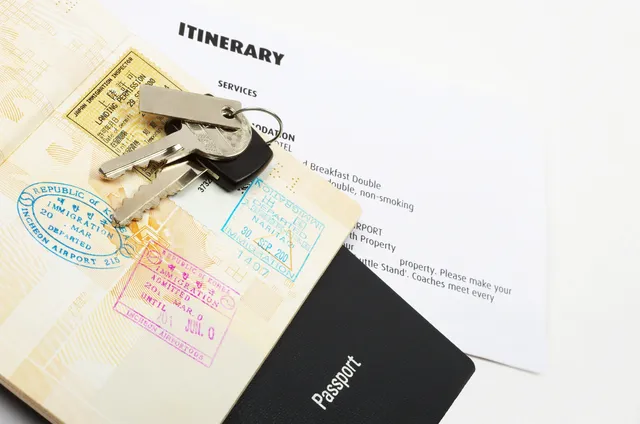Travel Insurance
Here are key considerations and tips for travelers seeking either international travel insurance or U.S. travel insurance. While exact needs can vary based on your itinerary, health status, and personal preferences, these points offer a solid starting framework for evaluating your options.


Determine Coverage Needs
- For international trips, look for policies that include emergency hospitalization, prescription medications, and evacuation services.
- U.S.-based travel insurance may still include emergency medical coverage—useful if your primary health plan offers limited out-of-network benefits.
- Covers non-refundable expenses if you must cancel or end a trip early due to emergencies (e.g., family illness, severe weather, job loss).
- Check the covered reasons for cancellation; some policies allow “cancel for any reason,” which typically costs more but provides broader coverage.
- Reimburses you if your luggage is lost, damaged, or stolen.
- Important for travelers carrying expensive equipment (e.g., cameras, laptops).
- Crucial if traveling to remote areas with limited medical infrastructure.
- Ensure the policy covers costs for air ambulance or medical repatriation back home if necessary.
Look for Pre-Existing Condition Waivers
- Pre-Existing Medical Conditions:
- Many plans exclude coverage for pre-existing conditions, unless you purchase a policy with a waiver.
- Time-sensitive waivers often require buying insurance soon after your first trip payment.
- If you have chronic conditions (e.g., diabetes, heart disease), verify how they’re treated by the policy to avoid claim denials.


Evaluate Policy Limits and Deductibles
- Coverage Limits:
- Policies vary in maximum coverage amounts for medical expenses, evacuation, and personal liability.
- Choose limits that reflect your destination’s healthcare costs (e.g., medical care in the U.S. can be expensive).
- Deductibles:
- Higher deductibles typically lower the premium but mean more out-of-pocket costs if you file a claim.
- Strike a balance between affordable premiums and manageable deductibles.
Check Policy Exclusions
- Adventure Activities & Sports:
- Activities like scuba diving, skiing, or trekking may require special add-ons.
- Carefully read any “hazardous sports” clauses if you plan adrenaline activities.
- Pandemic-Related Coverage:
- Post-COVID-19, confirm if your policy covers quarantine costs, testing, or trip cancellations related to epidemic/pandemic events.
- High-Risk Destinations:
- Some insurers exclude coverage for countries with travel advisories or high political unrest.
- Always confirm whether your intended destination is covered and if there are any associated surcharges.


Know the Claims Process
- 24/7 Assistance:
- Look for policies with round-the-clock helplines for emergencies, language support, and quick documentation help.
- Save these hotline numbers in your phone before departing.
- Required Documentation:
- Keep receipts, medical reports, and proof of incident (police reports, airline baggage irregularity forms) for hassle-free claims.
- File a claim promptly and follow the policy’s steps to avoid delays.
Check for COVID-19 and Other Pandemic/Epidemic Coverage
- Cancellation or Quarantine Coverage:
- Some policies explicitly include coverage if you test positive for COVID-19 before or during a trip, covering quarantine expenses or refundable trip costs.
- Others may only cover medical treatment if you become ill, but not the cost of extra lodging during quarantine.
- Country Entry Requirements:
- Some countries (e.g., certain destinations in Asia) still require proof of COVID-19 insurance for entry. Verify these rules in advance.


Compare Providers and Read Reviews
- Online Comparisons:
- Sites like InsureMyTrip, Squaremouth, or comparison tools from major insurers can help filter policies by coverage type and cost.
- Don’t just look at price—compare policy limits, reputation for claims service, and user reviews.
- Reputable Insurers:
- Look for well-known names or local insurers with strong ratings.
- An insurer’s reputation for handling claims promptly can be as important as the policy details.
Consider Annual vs. Single-Trip Coverage
- Frequent Travelers:
- If you take multiple trips per year, an annual (multi-trip) policy might be more cost-effective than purchasing coverage for each trip.
- Read coverage details carefully, as some annual plans cap each trip’s length (e.g., 30 or 45 days max per trip).
- Single-Trip Policies:
- Ideal for occasional travelers who want to tailor coverage specifically to one set of travel dates, destinations, and activities.


Additional Coverage Options
- Rental Car Collision:
- Some travel insurance plans include collision damage waiver for rental cars, which can save you money at the rental counter.
- Confirm if your credit card or existing auto policy already covers rentals.
- Travel Assistance Services:
- Look for concierge or travel aid services: lost passport assistance, emergency cash transfer, translation help, legal referrals, etc.
Policy Timing
- Purchase Early:
- Many benefits (like pre-existing condition waivers or “cancel for any reason” add-ons) require buying insurance soon after booking the trip.
- Delaying insurance means you might not be eligible for certain claims or you could lose out on coverage for unforeseen events.


Key Takeaways
- Match Coverage to Destination: If you’re visiting countries with higher medical costs (like the U.S.), ensure your limits are adequate.
- Read the Fine Print: Know exactly what’s included or excluded—especially for adventure activities or pre-existing conditions.
- Stay Organized: Keep documents, policy numbers, and emergency contacts accessible both digitally and physically.
- Buy Early: Lock in crucial benefits and avoid missing out on policy perks due to last-minute purchases.
By understanding the nuances of both international and U.S. travel insurance, you can tailor coverage to your specific needs and travel style. This ensures peace of mind on the road, allowing you to focus on enjoying your journey instead of worrying about potential mishaps.
